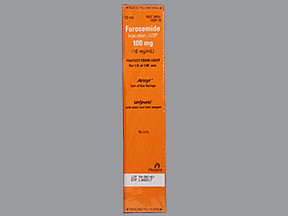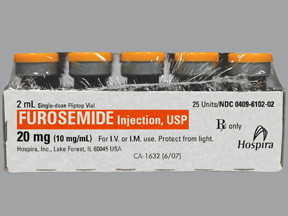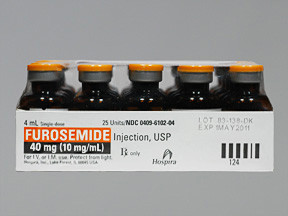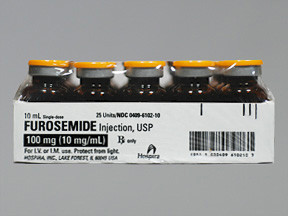FUROSEMIDE - INJECTION
PHONETIC PRONUNCIATION: (fure-OH-se-mide)
COMMON BRAND NAME(S): Lasix
GENERIC NAME(S): furosemide
Uses
USES: This medication is known as a diuretic (like a "water pill"). It helps your body get rid of extra water by increasing the amount of urine you make. Getting rid of extra water decreases the strain on your heart and blood vessels, thereby lowering high blood pressure and reducing your risk of strokes, heart attacks, and kidney problems. This effect can also improve symptoms such as trouble breathing and swelling (edema). This injectable form of furosemide is used when the drug cannot be taken by mouth, especially in patients with severe medical conditions.
How to use FUROSEMIDE - INJECTION
HOW TO USE: This medication is given by injection into a muscle or slowly into a vein as directed by your doctor. The dosage is based on your age, medical condition, and response to treatment. In children, the dosage is also based on weight. If you are giving this medication to yourself at home, learn all preparation and usage instructions from your health care professional. Before using, check this product visually for particles or discoloration. If either is present, do not use the liquid. Learn how to store and discard medical supplies safely. Tell your doctor if your condition persists or worsens.
Side Effects
Precautions
Interactions
Overdose
Images
Reviews
Faq for FUROSEMIDE - INJECTION
- Furosemide injection is used to treat fluid retention (edema) in people with congestive heart failure, liver disease, or kidney disorders.
- Furosemide is a diuretic medication that helps the kidneys eliminate excess water and salt from the body by increasing urine production.
- Furosemide injection is administered directly into a vein by a healthcare professional. The dose and frequency will be determined by your doctor based on your condition and response to treatment.
- Common side effects may include increased urination, dizziness, headache, muscle cramps, and low blood pressure. However, serious side effects such as severe allergic reactions and electrolyte imbalance can occur. Contact your doctor immediately if you experience any unusual symptoms.
- Furosemide can interact with several medications, including lithium, nonsteroidal anti-inflammatory drugs (NSAIDs), digoxin, and certain antibiotics. Inform your doctor or pharmacist about all the medications you are currently taking to avoid potential interactions.
- Furosemide may cause dehydration, so it is important to drink enough fluids while using this medication. It can also affect your blood electrolyte levels, so your doctor may regularly monitor your potassium, sodium, and calcium levels.
- Furosemide should be used during pregnancy only if clearly needed. It is important to consult your doctor before using this medication while breastfeeding as it may pass into breast milk.
- If you miss a dose, contact your doctor or the healthcare professional responsible for your treatment to reschedule the missed dose.
- An overdose of Furosemide can be dangerous and may cause symptoms such as severe dizziness, confusion, weakness, and fainting. If you suspect an overdose, seek immediate medical attention.
Disclaimer
IMPORTANT: HOW TO USE THIS INFORMATION: This is a summary and does NOT have all possible information about this product. This information does not assure that this product is safe, effective, or appropriate for you. This information is not individual medical advice and does not substitute for the advice of your health care professional. Always ask your health care professional for complete information about this product and your specific health needs.





No Reviews Yet